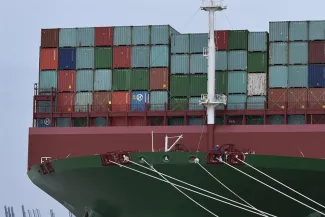Trade Policy

Overview
Countries use trade to generate economic growth. Trade also provides the resources societies need to function. However, governments can also leverage trade as a direct foreign policy tool to advance other national interests. In this hypothetical scenario, the United States needs to decide how to respond when a rivalry between growing trade partners threatens regional stability.
The Situation
First, cover the fundamentals of this foreign policy tool with the CFR Education resource, What Is Trade Policy? Then, put these principles into practice with this simulation's hypothetical decision point below.
Decision Point
Over the past decade, Denburg and its neighbor Fredonia have both undergone economic transformations. Fueled by the region’s natural resource wealth, both countries have become prominent trade partners with the United States. Denburg and Fredonia are suppliers of raw materials such as aluminum and have ramped up purchases of U.S. industrial machinery to support their growth. However, relations between Denburg and Fredonia are far from harmonious. Denburg has had frequent diplomatic clashes with Fredonia over territorial disputes. The nation has also rebuked U.S. criticisms of its repressive and undemocratic leadership. Fredonia, on the other hand, is developing a close partnership with the United States, participating in several U.S. security initiatives in the region. Although both countries continue to grow economically, their rivalry represents a threat to regional stability. Because of the United States’ burgeoning economic ties with both countries, the president has convened the National Security Council (NSC) to discuss how best to manage trade in the region. The president desires both to support the U.S. economy and to promote stability in the region.
NSC members should consider the following policy options:
- Negotiate a regional trade agreement that lowers or removes tariffs among Denburg, Fredonia, and the United States. This option would be the most economically beneficial to all countries. It could also incentivize greater stability between Denburg and Fredonia. This policy option could even pressure Denburg toward greater democratization. However, a trade agreement cannot guarantee improved relations or reforms. If Denburg continues its destabilizing activities, closer economic relations could make taking punitive measures more economically painful for the United States.
- Negotiate a bilateral trade agreement with Fredonia. Fredonia would be a more reliable trading partner and lowering barriers to trade with Fredonia could strengthen the country. This policy option could provide Fredonia the strength to better manage its rivalry with Denburg. However, this option would be less economically advantageous to the United States. An exclusive bilateral trade agreement also offers no economic incentive for Denburg to maintain regional stability.
- Use trade restrictions to punish Denburg’s destabilizing behaviors. These restrictions could include tariffs on Denburgese aluminum or sanctions restricting Denburg’s access to U.S. heavy machinery. This could push Denburg to improve its relations with Fredonia and ease repression. However, this policy option would be harmful to U.S. businesses and consumers.
Additional Resources
- How Trade Rules Are Written CFR Education
- Debate: Are Trade Agreements Good for Americans? New York Times
- Regional Trade Agreements World Bank
Need inspiration for how to structure your Mini Simulation?
More Mini Simulations


